

Passing Along the Lick: The Buried History of Downtown Roanoke – The Roanoke Rover. Volcanic rock hints at source of Earth’s water. Arctic-Images/Corbis Lava from Earth's mantle has given scientists clues about the origin of the planet's water.
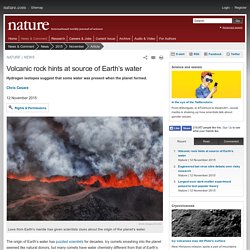
The origin of Earth’s water has puzzled scientists for decades. Icy comets smashing into the planet seemed like natural donors, but many comets have water chemistry different from that of Earth’s oceans. Rocky asteroids that contain water might have soaked the young planet, but analyses of meteorites — the asteroids’ remnants on Earth — show that the planet today is missing the material that those impacts should have left behind. Rosetta fuels debate on origin of Earth’s oceans / Rosetta. First measurements of comet’s water ratio Rosetta fuels debate on origin of Earth’s oceans 10 December 2014.
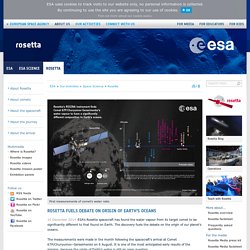
Landmark 20-Year Study Finds Pesticides Linked to Depression In Farmers. By Dan Nosowitz on November 7, 2014 A landmark study indicates that seven pesticides, some widely used, may be causing clinical depression in farmers.
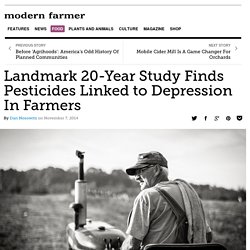
Will the government step in and start regulating these chemical tools? Earlier this fall, researchers from the National Institute of Health finished up a landmark 20-year study, a study that hasn’t received the amount of coverage it deserves. 13 Reasons Tea Is (Healthy and) Awesome: Greatist.com. Put down those saucer cups and get chugging — tea is officially awesome for your health.
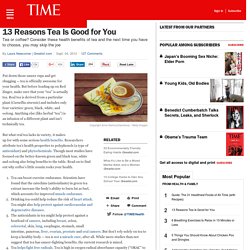
But before loading up on Red Zinger, make sure that your “tea” is actually tea. Real tea is derived from a particular plant (Camellia sinensis) and includes only four varieties: green, black, white, and oolong. Anything else (like herbal “tea”) is an infusion of a different plant and isn’t technically tea. But what real tea lacks in variety, it makes up for with some serious health benefits. Farm kills millions of bees with illegal pesticide spraying, gets slap on wrist. The U.S. Navy Just Announced The End Of Big Oil And No One Noticed - Surf’s up!

The Navy appears to have achieved the Holy Grail of energy independence – turning seawater into fuel: After decades of experiments, U.S. Navy scientists believe they may have solved one of the world’s great challenges: how to turn seawater into fuel. …The new fuel is initially expected to cost around $3 to $6 per gallon, according to the U.S. Naval Research Laboratory, which has already flown a model aircraft on it. A giant basket that uses condensation to gather drinking water. Wendell Berry: A Strong Voice For Local Farming and the Land by Roger Cohn. 06 Mar 2014: Interview by roger cohn Wendell Berry wrote about and practiced “sustainable agriculture” long before the term was widely used.
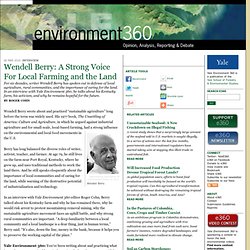
His 1977 book, The Unsettling of America: Culture and Agriculture, in which he argued against industrial agriculture and for small-scale, local-based farming, had a strong influence Reprinted by permission of Counterpoint Press, © 2012 Wendell Berry on the environmental and local food movements in the U.S. A Century of Controversy, Accidents in West Virginia’s Chemical Valley in Lead-up to Spill. Even before last week's chemical spill fouled tap water in nine counties in West Virginia, where more than 200,000 people still cannot use their water after seven long days, it was not unusual to find black water running from kitchen faucets in homes outside Charleston.

Or to see children with chronic skin rashes. Or bathtub enamel eaten away, leaving locals to wonder what the same water was doing to their teeth. "Welcome to our world," says Vivian Stockman, 52, a longtime resident of rural Roane County, north of Charleston, the state capital, and an activist with the Ohio Valley Environmental Coalition. Indeed, people who live in the Kanawha River Valley, which much of the world learned recently is also known as Chemical Valley, have endured a long history of pollution of many kinds. An aerial view of Catenary Coal Co. mountaintop removal site near Kayford Mountain in West Virginia.
Community farming - it's not about food: Josh Slotnick at TEDxUMontana. The real threat to our future is peak water. Peak oil has generated headlines in recent years, but the real threat to our future is peak water.
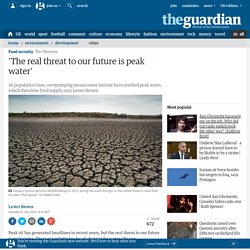
There are substitutes for oil, but not for water. We can produce food without oil, but not without water. We drink on average four litres of water per day, in one form or another, but the food we eat each day requires 2,000 litres of water to produce, or 500 times as much. Getting enough water to drink is relatively easy, but finding enough to produce the ever-growing quantities of grain the world consumes is another matter. Grain consumed directly supplies nearly half of our calories. Start-up promises to revolutionise shrimp farming. A UK start-up says it has developed a low-cost, ecological alternative to traditional shrimp farming by using bacteria as both a water filter and food for its shrimp.
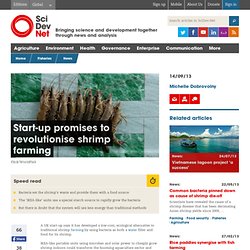
IKEA-like portable units using microbes and solar power to cheaply grow shrimp indoors could transform the booming aquaculture sector and prevent further environmental degradation, according to its inventors. If made available to farmers in developing countries, the technology could help tackle malnourishment while reducing environmental degradation, and all at a lower cost than current shrimp production, they say.
Founded by biochemical engineering students from University College London, the start-up Marizca is producing whiteleg shrimp in central London in its first trial operations. Global production of farmed shrimp has been growing at about ten per cent a year, according to conservation charity the World Wildlife Fund, and farmed shrimp now accounts for about 55 per cent of global shrimp production. Can Wave Power Really Make Waves Against Fossil Fuels? About 15 years ago, the state of Oregon “began pushing the idea of making renewable energy from the ocean waves that bob and swell on the Pacific horizon,” reports The New York Times.

Eco-Friendly Farming: Sowing the Seeds of Renewable Energy. Twelve percent of global greenhouse gas emissions come from agriculture, and six to nine percent of farm expenses are energy related. Using renewable energy in agriculture has benefits for both the economy and the environment, and many farms around the world are using the abundance of on-site renewable resources to produce energy. Here is a look at how renewable energy – from solar power to microbial digestion – is changing the future of agriculture.
Photosynthesis to Photovoltaics With expanses of land and a need to source power to remote locations, solar energy is well-suited for life on the farm. In the United States, the number of solar projects on farms funded by the USDA’s REAP program increased fivefold between 2007 and 2009, according to a report by the USDA (pdf). Drought may yield benefits for wineries and wine lovers. Nestled on a hillside in northern Virginia, Breaux Vineyards' 105 acres of vines are looking good this year, according to General Manager Chris Blosser. While California still makes the vast majority of American wine, all 50 states produce it.
Virginians have been growing grapes for some 400 years, starting in the Jamestown settlement, and the wine business has surged in the state over the last decade. Soil and climate conditions in Loudoun County, where this family-owned vineyard is located, make it one of Virginia's top wine-producing regions. The drought plaguing much of the country has hurt corn and soy crops, with the U.S. Department of Agriculture estimating that 2012-2013 corn yields would hit the lowest level since 1995-1996. Clarified: What does "organic" mean? In cooking, the process of clarification entails straining out extraneous muck from liquids so that they might be pure, clear and ideal for consumption. With this series on food terminology and issues we're attempting to do the same. Organic: it's a word that gets bandied and bashed around a lot. Plenty of folks believe it's synonymous with "healthy," while others think it's just an excuse for companies to vacuum the last of the cash from your wallet.
Politics aside, what does the term actually mean? Produce: Organic produce is grown without the use of synthetic fertilizers, sewage sludge, irradiation, and genetic engineering, and relies on natural or mechanical methods, rather than prohibited chemicals, for pest control. Growing populations of brown marmorated stink bug could harm late-season crops. CORVALLIS, Ore. – Oregon State University researchers warn of an increased risk of damage to late-ripening crops this year after discovering record levels of the brown marmorated stink bug, a newly established invasive pest in Oregon.
Why 2013 will be a year of crisis. Prediction: 2013 will be a year of serious global crisis. The Drought and the Gulf of Mexico Dead Zone. As Susquehanna Nears Sediment Capacity, Chesapeake Bay Likely to Suffer. The Susquehanna is a mighty river in the northeastern United States which feeds into the Chesapeake Bay in Maryland. Why Water Scarcity Means Food Scarcity. Fukushima radiation levels spike, company says. TEPCO found high radiation readings SaturdayIt said the highest levels measured were so-called beta radiation (CNN) -- There's been a sharp spike in radiation levels measured in the pipes and containers holding water at the crippled Fukushima Daiichi nuclear plant in Japan.
Wild thing, I think I need you: How weeds could save dinner. Edible Spray Paint: Give Your Foods The Midas Touch : The Salt. Streams stressed by pharmaceutical pollution. Grey Water. Morsi visits Ethiopia to seek unity in Nile nations over water. Throwing our food away: Up to 50% of the food produced worldwide is wasted. Open Letter to Secretary Vilsack on Food Systems. Global report: Obesity bigger health crisis than hunger. Katrina damage blamed on wetlands loss. Smooth as Silk: How big brands milk small farmers for all they’re worth.
UCAR - University Corporation for Atmospheric Research. Scientists launch international study of open-fire cooking and air quality. A Generation in Jeopardy: How pesticides are undermining our children’s health & intelligence. From 'fertilizer to fork': food accounts for a quarter of the world's greenhouse gas emissions. 10 Facts About Vitamin D and Rheumatoid Arthritis - Rheumatoid Arthritis. Eat to Beat Knee Osteoarthritis and Other Aching Joints. There’s arsenic in your rice — and here’s how it got there. Stunning undersea panoramas now on Google Street View. Status Report on the Hindu Kush-Himalayan Glaciers. I’m Melting… Or Am I? (a multi-facted reminder) From dry rivers to dead deer, drought's impact felt everywhere. McDonald's to include calorie counts on menu boards, but will that deter diners? Growing the next generation of young farmers. Hurricane Isaac.
33 Ways to Eat Environmentally Friendly. Eat Like a Champ: The Best Foods for Runners. Study Questions Advantages of Organic Meat and Produce. Philadelphia Cleans Up Storm Water With Innovative Program. Fishing the Forgotten Anacostia River in Washington DC.